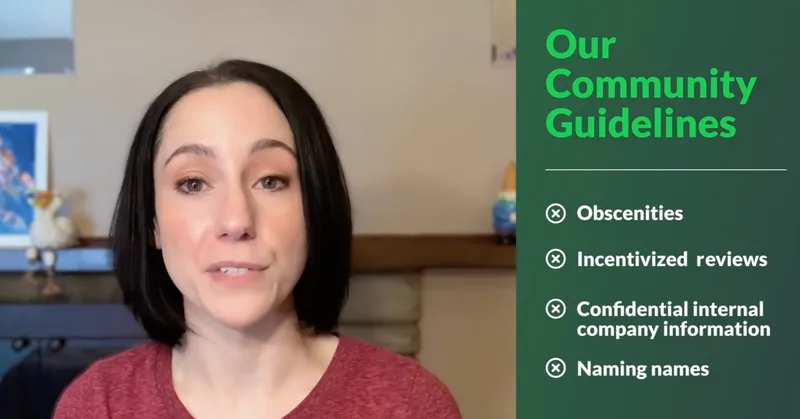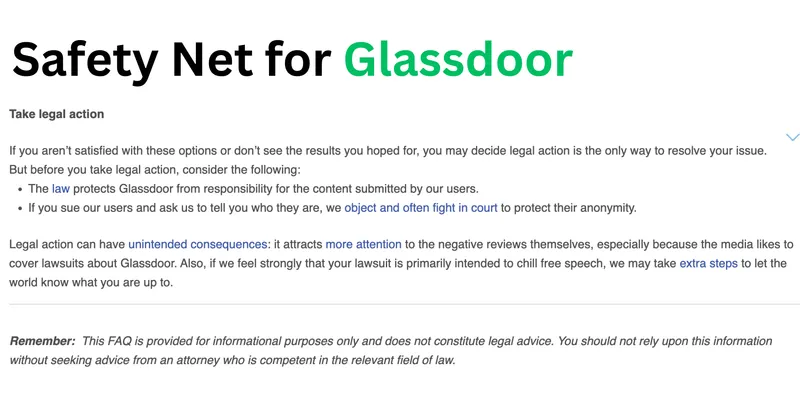Why GlassDoor's Unverified Reviews Could Cost Good Companies a Fortune?
While GlassDoor is meant to help employees, investors, and clients understand the companies, it needs to do a better job of making sure the reviews are true.
Glassdoor is a popular platform where employees can anonymously review their workplaces. It is the platform where people go to share their work experiences with companies. These sites can be really helpful for job seekers trying to find out what it's like to work somewhere. But there's a big issue: not all reviews have to be proven true before they’re posted. This means anyone can say anything, whether it’s true or not, and that can lead to problems.
While the initial idea of Glassdoor was to create transparency and help job seekers find a good fit, the lack of a robust fact-checking system has turned it into a breeding ground for "grudge posting," potentially costing good companies a fortune.
"It takes 20 years to build a reputation and five minutes to ruin it." - Warren Buffet
Unverified Reviews: A Breeding Ground for Grudge Posting
While Glassdoor verifies reviewers' employment status with the company, it doesn't confirm the truthfulness of their claims. This loophole allows disgruntled ex-employees, or even existing employees with malicious intent, to post negative reviews based on personal vendettas or biases, without fear of consequence. This creates an environment where people with personal vendettas can damage a company's reputation with false or misleading information.

Guidelines Aren't Enough: Addressing the One-Sided Story
While Glassdoor has guidelines in place to prevent obscene content, these guidelines only address the content itself, not the authenticity of the information. For example, while name-calling (except for leadership, again a big damaging loophole if misused) or confidential information may be removed, these measures only skim the surface. There is no system to verify if the claims the reviewer is making are true. This loophole allows for one-sided stories, which may not necessarily reflect the truth. This fosters a negative environment where honest feedback gets overshadowed by emotional outbursts and one-sided narratives.
Think about it - not everyone likes their boss or agrees with every company rule. Being part of a workplace means sometimes you have to do things you might not want to, like working on a day you wanted off. Sometimes, people get upset if they don’t get promoted or if they lose their job for not doing well. And when they’re upset, they might go online and write bad things about the company or the bosses, even if it’s not the whole story.
The Responsibility of Both Sides
It's important to acknowledge that not every negative review on Glassdoor is false. However, the platform's lack of fact-verification creates a system where resentful employees, regardless of their performance or reason for leaving, can potentially damage a company's reputation. On the other hand, some employees might not take responsibility for addressing their concerns within the company before resorting to public criticism. Open communication and raising concerns internally should always be the first step, allowing companies the opportunity to address and improve. Sometimes, all it takes is a conversation to fix things, but it is way easier to comment something bad than to take the initiative to bring a change or even bring something to light.
The Domino Effect of Grudge Posting
These unverified and potentially misleading reviews can inflict severe damage on companies in several ways:
- Reputational Damage: Negative reviews, even if untrue, can significantly impact a company's reputation, deterring potential investors, partners, and top talents from engaging. This can lead to missed business opportunities, reduced brand value, and ultimately, financial losses.
- Recruitment Challenges: Job seekers often rely heavily on online reviews to form their initial impressions of potential employers. Unverified negative reviews can significantly discourage qualified candidates from applying, making it difficult for companies to attract and retain skilled personnel.
- Morale Decline: Existing employees can be demoralised by seeing their workplace portrayed negatively online, especially if they disagree with the claims. This can foster a sense of negativity and distrust within the organisation, potentially impacting productivity and overall employee morale.

Safety Net for Glassdoor or a Threat?

While sites like GlassDoor are meant to help, they need to do a better job of making sure the reviews are true. This way, they can protect companies from unfair damage and help job seekers get an accurate picture of where they might work. Until this happens, there’s a chance that these platforms can do more harm than good, and that’s something we should all think about.
Moving Beyond the Grudge: A Call for Balance
While unverified reviews present significant challenges, completely silencing employee voices is not the answer. Striking a balance between open communication and responsible information sharing is crucial. Platforms like Glassdoor can consider implementing measures such as:
- Encouraging verified reviews with stronger safeguards against fabricated content.
- Providing companies with the opportunity to respond to reviews and clarify their position before the review goes live.
- Implementing stricter guidelines to discourage emotional and subjective language in reviews.
By promoting a more responsible and fact-based approach to online reviews, we can work towards creating a platform that empowers both employees to share genuine feedback and protects companies from false allegations.
Edited by Roshni Manghnani







